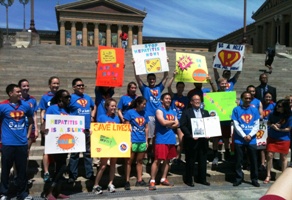 By Christine Kukka
By Christine Kukka
When my daughter thinks about how active she should be in raising awareness about hepatitis B, she gets tripped up by racial identity and politics.
Recently, she attended a workshop where people living with hepatitis B told their stories. It was empowering and energizing, and then she went home to a state where the majority are white, the governor claims immigrants are bringing in new diseases, and no one has ever heard about hepatitis B.
“Suddenly, I feel paralyzed,” she told me. “I look at the other people in my hepatitis B group and all of us were Asian or Black. I’m afraid if I tell my story here at home that everyone will assume everyone who’s Asian has hepatitis B.”
Instead of increasing white America’s compassion and empathy towards people with hepatitis B, she fears it might make them more afraid of people of color. Her fears are understandable. In this era of Trump, hate crimes and backlash against immigrants have increased. She’s afraid speaking out might unwittingly reinforce simmering racist stereotypes. She wonders if she has that much courage.
She’s worried about how it will affect her personally. Already she sees some clients she works with gravitate and open up more to her white coworkers. “I don’t know if I’m over-thinking it all, and feeling overwhelmed about how to handle this,” she confided.
There is a story about a Asian-American researcher who worked on hepatitis B for decades. When she conducted some independent screening in her community and discovered that a large percentage of Korean-Americans tested positive for hepatitis B, she was fearful. She never published her findings, she was afraid it would fuel racism against Asian-American immigrants. She chose self-censorship instead.
Much has been written lately about how much more empathy the American public and some politicians appear to have toward the rural opiate addiction crisis now that it has a “white face,” given that addiction in inner cities has decimated generations of African-Americans for decades.
Does my daughter intuitively know that America has far more sympathy (and dedicates more funding) for diseases that affect white and middle-class communities than minority populations?
I try to give her another take on the situation, suggesting that the human map of hepatitis B is defined by access to healthcare. People in poor regions of the world don’t have access to the hepatitis B vaccine birth dose, which must be administered within 12 hours of birth to break the mother-to-child infection cycle, or to sterile syringes and medical equipment.
I explain it’s the same in rural America. The hepatitis B vaccine has been available since 1982 and recommended for all children and adolescents, yet today there is an uptick in new hepatitis B infections among injecting drug users. Uninsured adults who didn’t have access to preventive healthcare and the hepatitis B vaccine growing up are now getting infected from the opioid epidemic. Just like Africa and Asia, medical insurance and access to healthcare defines who lives and dies.
Just like Africa and Asia, in rural and low-income America, access to insurance and healthcare defines who lives and dies.
In the late 1980s, a young group of AIDS activists created ACT Up, a noisy, boisterous group that fought the government and big pharma in order to speed up the AIDS drug approval process. They even took over the National Institutes of Health office at one point and unfurled a banner that read: Silence = Death.
For a long time, white America thought everyone who was gay had AIDS. But over time, they stopped making that assumption. It takes time, education, and tireless and selfless advocacy. We all do what we can, when we can.

